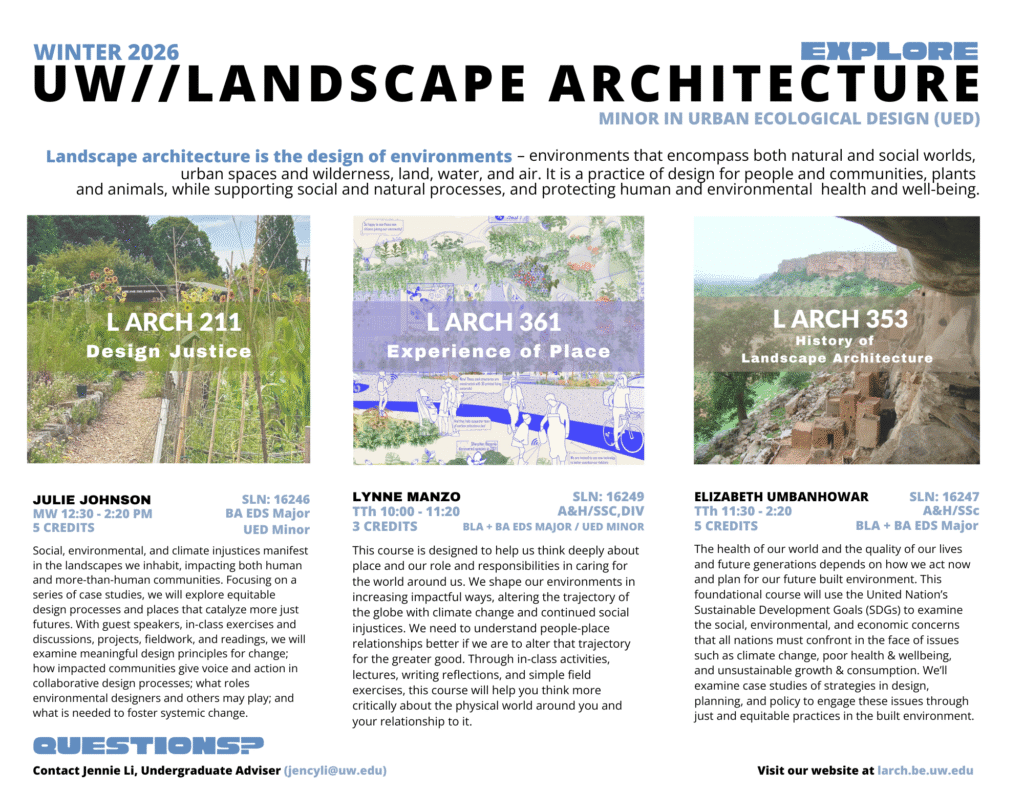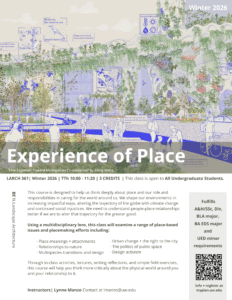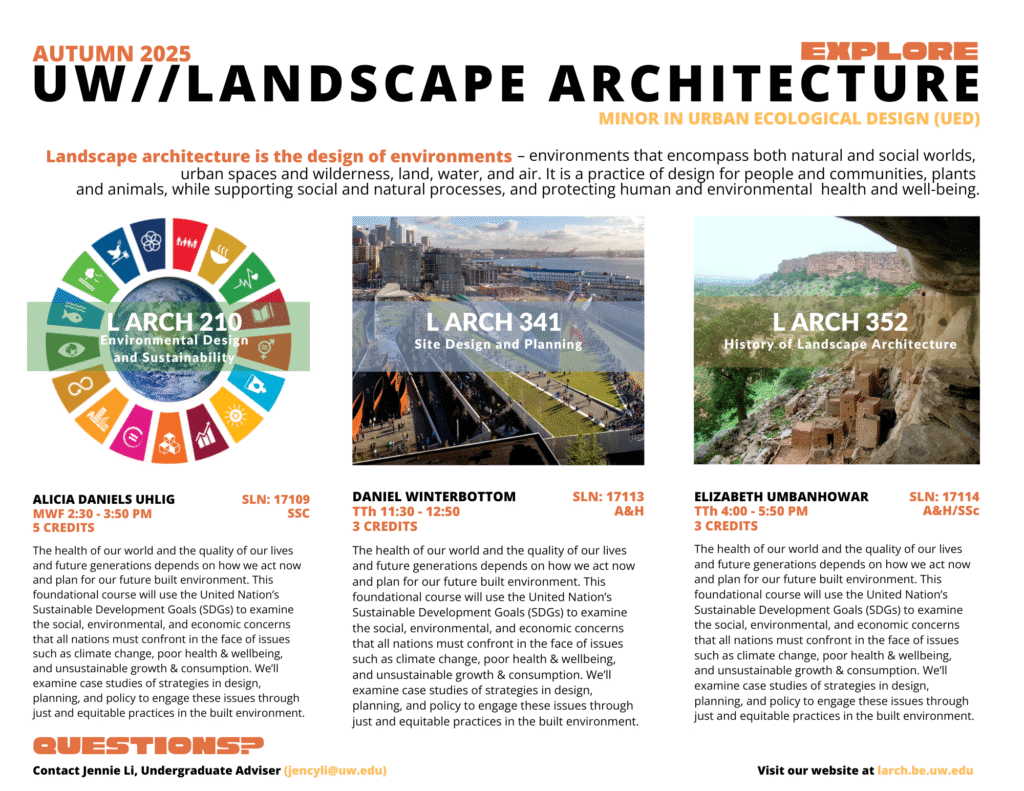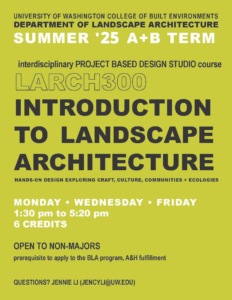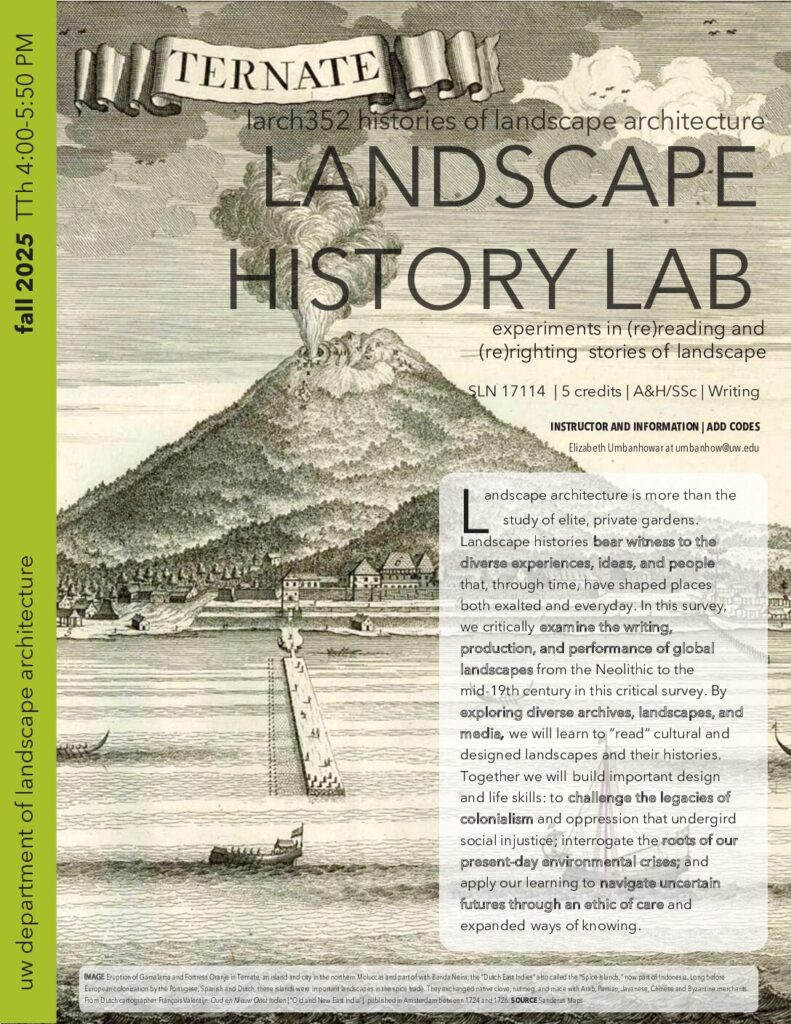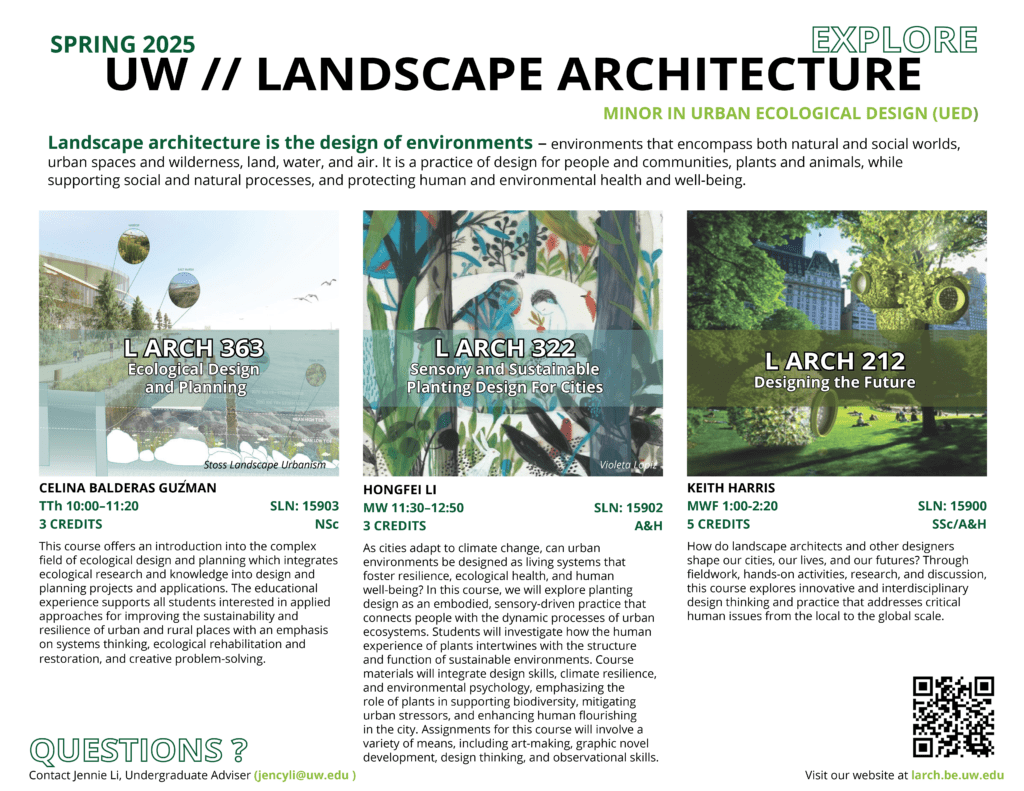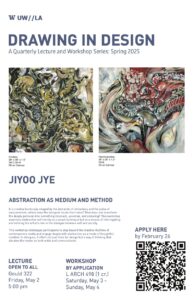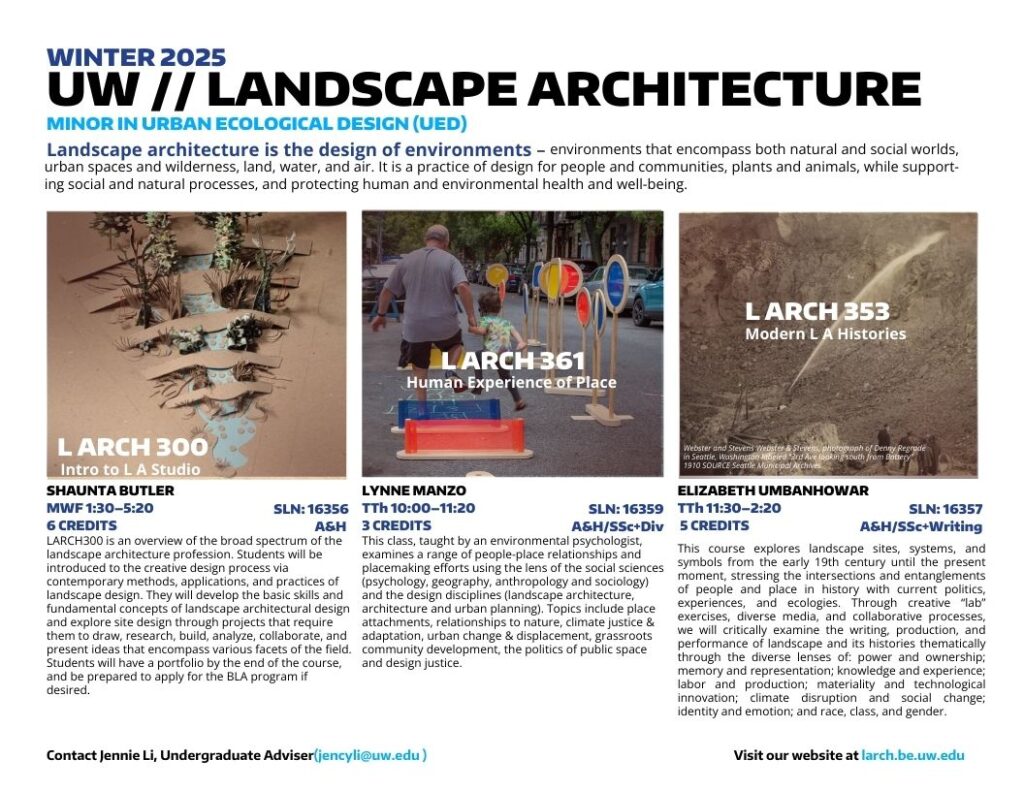We offer a wide variety of courses and are receiving increasing recognition for our leadership in the use of innovative teaching methods in studio courses, research on emerging landscape design issues, and community-building services.
Our courses integrate the development of core design skills with our research, teaching and service focus on urban ecological design. Highlights include:
- Culturally-based place making, through design build studio, cultural landscape, and community design studios
- Ecological infrastructure through natural processes, ecological planning and design, and landscape technology studios
- Design for ecological literacy in all coursework
- Participatory design in advanced landscape architecture and interdisciplinary studios
The University of Washington Course Catalog provides a general description for our courses. See below for recent and current course lists. Contact landarchinfo@uw.edu for course syllabi.
2025 – 2026 Course Lists
UWLA Spring 2026 Course Offerings
UWLA Winter 2026 Course Offerings
UWLA Autumn 2025 Course Offerings
Spring 2026 MLA Selective Course Offerings
Spring 2026 BLA Directed Electives
Spring 2026 Courses Open to Non Majors + Special Topics
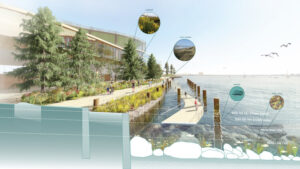 Celina Balderas Guźman
Celina Balderas Guźman
3 credits, BLA requirement, Counts towards NSc requirements
TTh 12:30 – 1:50PM
SLN: 15706
This lecture course offers an introduction into the complex field of ecological design and planning which integrates ecological research and knowledge into design and planning projects and applications. The educational experiences supports all students interested in applied approaches for improving the sustainable and resilience of urban and rural places with an emphasis on systems thinking, ecological rehabilitation and restoration, and creative problem-solving.
Open to all students
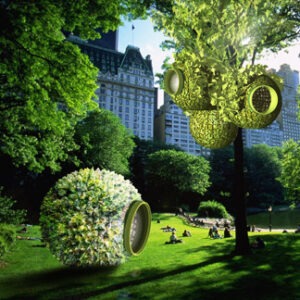
Keith Harris
5 credits, Counts towards SSc/A&H requirements
MWF 1:30-2:50PM
SLN: 15703
How do landscape architects and other designers shape our cities, our lives, and our futures? Through fieldwork, hands-on activities, research, and discussion, this course explores innovative and interdisciplinary design thinking and practice that addresses critical human issues from the local to the global scale.
Open to all students
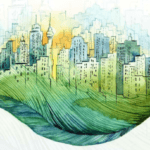 Nat Gregorius
Nat Gregorius
3 credits, Counts towards A&H requirements
TTh 11:30-12:50PM
SLN: 15705
As urban areas continue to accommodate an ever-growing population, how can urban inhabitants embrace design ideas that reconnect human beings with nature and re-conceptualize cities as resilient ecosystems? In this course, we will explore this question through a variety of topics related to contemporary design theories and practices in urban planning, landscape architecture, and green technologies. As an introductory course, LA322 aims to offer foundational knowledge relating to living materials and systems, urban ecological design, and biophilic design in the built environment, while exploring opportunities and cultivating creativity for planning and design practices.
Eric Higbee
5 Credits, Counts towards MLA / BLA Plant ID. Can be applied to UED Minor.
TTh 2:30 – 5:20PM
SLN: 15709
Plants are the living communities that sustain life. A familiarity with plants and their ecosystems is foundational to building resilient landscapes. Students will learn to identify PNW native plants, North American native, and introduced species through multiple ways of identifying including pattern recognition and dichotomous keys. Each week will include a plant identification walk nearby or on campus. The course will explore ethnobotanical relationships with plants, as well as biocultural, ecological and maintenance considerations. This course also offers students the opportunity to broaden the range of skills used in landscape architecture to include ecological design, horticulture, taxonomy, and the ways plants influence our culture and sense of place.
 3 credits, Counts towards MLA BioPhys Ecology Selective
3 credits, Counts towards MLA BioPhys Ecology Selective
MW 11:30 – 12:50PM
SLN:15717
Open to all graduate students.
This advanced seminar examines the integration of ecological systems with contemporary landscape infrastructure through critical readings, case studies, and student research. Pairing foundational ecological concepts with innovative design applications, students will explore how ecological understanding shapes cutting-edge landscape architectural practice. Through intensive reading, writing, and analysis of significant projects, the seminar develops frameworks for designing landscapes that work with natural processes while addressing urgent environmental challenges.
Lynne C. Manzo
3 Credits
TTh 2:30 – 3:50 PM
SLN: 15719
This class is open to all graduate students.
This graduate seminar focuses on a range of qualitative approaches for conducting community-based research to support design. Methods include photo-voice, mapping, world cafe, archival research, interviews, surveys and data visualization. The course will also cover different ways of knowing, how to develop feasible research questions, research/design ethics & power relations.
This applied approach will prepare students for their capstone project through hands-on experience that builds research skills, especially for those that are interested in learning methods that apply directly to conducting community research.
Learning Goals:
- Better understand the connections between research & design
- Understand the ethical underpinnings of research, including values & power relations
- Gain first-hand experience using research methods through exercises & fieldwork
- Learn what method to use in response to certain situations, sites, & questions
- Develop ideas for a possible Capstone Project
Past Terms
LArch 211 Design Justice
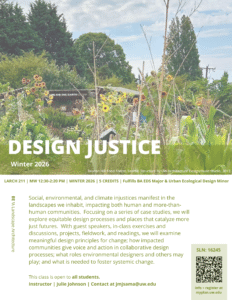 Julie Johnson
Julie Johnson
5 Credits, Fulfills BA EDS Major & Urban Ecological Design Minor
TTh 2:30 – 4:20PM
SLN: 16245
Social, environmental, and climate injustices manifest in the landscapes we inhabit, impacting both human and more-than-human communities. Focusing on a series of case studies, we will explore equitable design processes and places that catalyze more just futures. With guest speakers, in-class exercises and discussions, projects, fieldwork, and readings, we will examine meaningful design principles for change; how impacted communities give voice and action in collaborative design processes; what roles environmental designers and others may play; and what is needed to foster systemic change.
LArch 300 Introduction to Landscape Architecture
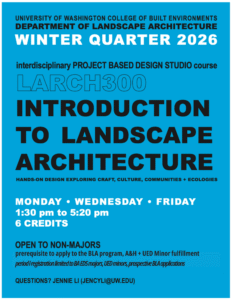 Shaunta Butler
Shaunta Butler
6 credits A&H, fulfills BLA prerequisite, BA EDS major, UED minor
Period I registration limited to students declared UED minor, BA EDS major, or BLA applicants
MWF 1:30-5:20
SLN: 11772
LARCH300 is an overview of the broad spectrum of the landscape architecture profession. Students will be introduced to the creative design process via contemporary methods, applications, and practices of landscape design. They will develop the basic skills and fundamental concepts of landscape architectural design and explore site design through projects that require them to draw, research, build, analyze, collaborate, and present ideas that encompass various facets of the field.
Reach out to Jennie jencyli@uw.edu for questions/if you are applying to the BLA program this year for priority registration access
LArch 353 History of Modern Landscape Architecture
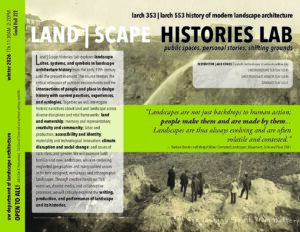 Elizabeth Umbanhowar
Elizabeth Umbanhowar
5 Credits A&H/SSc+Writing, counts towards BLA major
TTh 11:30–2:20
Undergraduate SLN: 16247
Undergraduate Honors SLN:16248
Graduate SLN: 16261
This course explores landscape sites, systems, and symbols from the early 19th century until the present moment, stressing the intersections and entanglements of people and place in history with current politics, experiences, and ecologies. Through creative “lab” exercises, diverse media, and collaborative processes, we will critically examine the writing, production, and performance of landscape and its histories thematically through the diverse lenses of: power and ownership; memory and representation; knowledge and experience; labor and production; materiality and technological innovation; climate disruption and social change; identity and emotion; and race, class, and gender.
L Arch 361 Human Experience of Place
Lynne Manzo
3 credits, Fulfills A&H/SSc, Div, BLA Major, BA EDS Major & UED Minor Requirements
TTh 10:00 – 11:20AM
This course is designed to help us think deeply about place and our role and responsibilities in caring for the world around us. We shape our environments in increasing impactful ways, altering the trajectory of the globe with climate change and continued social injustices. We need to understand people-place relationships better if we are to alter that trajectory for the greater good.
Using a multidisciplinary lens, this class will examine a range of place-based issues and placemaking efforts including:
- Place meanings + attachments
- Relationships to nature
- Multispecies transitions and design
- Urban change + the right to the city
- The politics of public space
- Design activism
Through in-class activities, lectures, writing reflections, and simple field exercises, this course will help you think more critically about the physical world around you and your relationship to it.
L Arch 561 Human Experience of Place
Lynne Manzo
3 credits, Fulfills Socio-Political Dimensions Selective Requirements
MW 10:00 – 11:20AM
This seminar is designed to help us think deeply about place and our role and responsibilities in caring for the world around us. We shape our environments in increasing impactful ways, altering the trajectory of the globe with climate change and continued social injustices. We need to understand our relationships to the physical environment better if we are to shift that trajectory for the greater good.
Using a multidisciplinary lens, this seminar will examine a range of place-based issues and placemaking efforts including:
- Place meanings + attachments
- Relationships to nature
- Multispecies transitions and design
- Urban change + the right to the city
- The politics of public space
- Design activism
Through discussions, in-class activities, lectures, writing reflections, and simple field exercises, this seminar will help you think more critically about the physical world around you and your relationship to it.
LArch 300 Introduction to Landscape Architecture
Shaunta Butler
6 credits A&H, fulfills BLA prerequisite
MWF 1:30-5:20, Summer full term (A + B)
SLN: 11772
LARCH300 is an overview of the broad spectrum of the landscape architecture profession. Students will be introduced to the creative design process via contemporary methods, applications, and practices of landscape design. They will develop the basic skills and fundamental concepts of landscape architectural design and explore site design through projects that require them to draw, research, build, analyze, collaborate, and present ideas that encompass various facets of the field.
LArch 210 Environmental Design & Sustainability
Alicia Daniels Uhlig
5 credits, Counts towards NSc requirements
MW 2:30-4:20PM
SLN: 17109 or 17110 for FID Students
The health of our world and the quality of our lives and future generations depends on how we act now and plan for our future built environment. This foundational course will use the United Nation’s Sustainable Development Goals (SDGs) to examine the social, environmental, and economic concerns that all nations must confront in the face of issues such as climate change, poor health & wellbeing, and unsustainable growth & consumption. We’ll examine case studies of strategies in design, planning, and policy to engage these issues through just and equitable practices in the built environment
Open to all students
LArch 352 History of Landscape Architecture
Elizabeth Umbanhowar
5 Credits A&H/SSc+Writing, counts towards BLA major
TTh 11:30–2:20
SLN: 16357
Landscape architecture is more than the study of elite, private gardens. Landscape histories bear witness to the diverse experiences, ideas, and people that, through time, have shaped places both exalted and everyday. In this survey, we critically examine the writing, production, and performance of global landscapes and their narratives from the Paleolithic to the mid-19th century in this critical survey. Through diverse archives, landscapes, and media, we will learn to “read” cultural and designed landscapes and their histories offers important life skills: to challenge the legacies of colonialism and oppression, interrogate our present-day environmental crises, and apply our learning to navigate uncertain futures.
Open to all students
LArch 341 Site Design and Planning
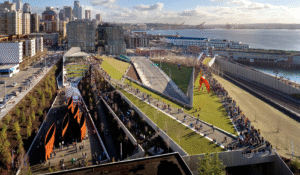 Daniel Winterbottom
Daniel Winterbottom
3 credits, Counts towards A&H requirements
TTh 11:30 AM – 12:50PM
SLN: 17113
“Site design and planning is the art and science shaping the places we live and work. Its aim is foundationally moral and aesthetic: to enhance everyday life.” – Lynch and Hack, Site Planning
Through field trips, lectures, drawing, and discussion, this course explores the art and science of shaping sites. Balancing broad conceptual frameworks with practical tools, we will survey the ecological, cultural, political and technical dimensions that influence site design and planning in contemporary practice.
Open to all students
Spring 2025 Courses Open to Non Majors + Special Topics
LArch 212 Designing the Future

Keith Harris
5 credits, Counts towards SSc/A&H requirements
MWF 1:00-2:20PM
SLN: 15900
How do landscape architects and other designers shape our cities, our lives, and our futures? Through fieldwork, hands-on activities, research, and discussion, this course explores innovative and interdisciplinary design thinking and practice that addresses critical human issues from the local to the global scale.
Open to all students
LArch 322 Sensory and Sustainable Planting Design for Cities
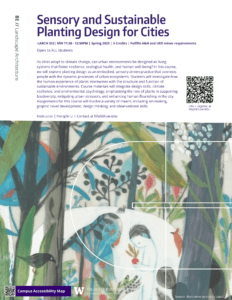 Hongfei Li
Hongfei Li
3 credits, Counts towards A&H & UED minor requirements
MW 11:30 – 12:50PM
SLN: 15092
As cities adapt to climate change, can urban environments be designed as living systems that foster resilience, ecological health, and human well-being? In this course, we will explore planting design as an embodied, sensory-driven practice that connects people with the dynamic processes of urban ecosystems. Students will investigate how the human experience of plants intertwines with the structure and function of sustainable environments. Course materials will integrate design skills, climate resilience, and environmental psychology, emphasizing the role of plants in supporting biodiversity, mitigating urban stressors, and enhancing human flourishing in the city. Assignments for this course will involve a variety of means, including art-making, graphic novel development, design thinking, and observational skills.
Open to all students
LArch 363 Ecological Design and Planning
 Celina Balderas Guźman
Celina Balderas Guźman
3 credits, BLA requirement, Counts towards NSc requirements
TTh 10:00 – 11:20AM
SLN: 15903
This lecture course offers an introduction into the complex field of ecological design and planning which integrates ecological research and knowledge into design and planning projects and applications. The educational experiences supports all students interested in applied approaches for improving the sustainable and resilience of urban and rural places with an emphasis on systems thinking, ecological rehabilitation and restoration, and creative problem-solving.
Open to all students
LArch 423 Plant Identification and Management
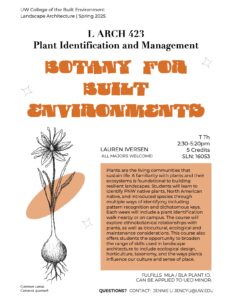 Lauren Iversen
Lauren Iversen
3 Credits, Counts towards MLA / BLA Plant ID. Can be applied to UED Minor.
TTh 2:30 – 5:20PM
SLN: 15906
Plants are the living communities that sustain life. A familiarity with plants and their ecosystems is foundational to building resilient landscapes. Students will learn to identify PNW native plants, North American native, and introduced species through multiple ways of identifying including pattern recognition and dichotomous keys. Each week will include a plant identification walk nearby or on campus. The course will explore ethnobotanical relationships with plants, as well as biocultural, ecological and maintenance considerations. This course also offers students the opportunity to broaden the range of skills used in landscape architecture to include ecological design, horticulture, taxonomy, and the ways plants influence our culture and sense of place.
LArch 454 The Nature of Cities
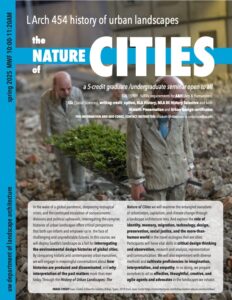 Elizabeth Umbanhowar
Elizabeth Umbanhowar
5 Credits, A&H/SSc+Writing, counts towards BLA major, MLA BE History Selective, Historic Preservation and Urban Design Certificates
MWF 10:00 – 11:20 AM
SLN: 15909
In the wake of a global pandemic, deepening ecological crises, and the continued escalation of socioeconomic divisions and political upheavals, interrogating the complex histories of urban landscapes offers critical perspectives that both can inform and empower us in the face of challenging and unpredictable futures. In this course, we will deploy Seattle’s landscape as a foil for interrogating the environmental design histories of global cities. By comparing historic and contemporary urban narratives, we will engage in meaningful conversations about how histories are produced and disseminated, and why interpretation of the past matters more than ever today. Through the History of Urban Landscapes: The Nature of Cities we will examine the entangled narratives of colonization, capitalism, and climate change through a landscape architecture lens. And explore the role of identity, memory, migration, technology, design, preservation, social justice, and the more-than-human world in the novel ecologies that are cities. Participants will hone vital skills in critical design thinking and observation, research and analysis, representation and communication. We will also experiment with diverse methods and cultivate proficiencies in imagination, interpretation, and empathy. In so doing, we prepare ourselves to act as effective, thoughtful, creative, and agile agents and advocates in the landscapes we inhabit.
Drawing in Design Workshop
1 Credit Workshop (By Application)
See Drawing in Design page for more information
LArch 498 B LA BIM Seminar
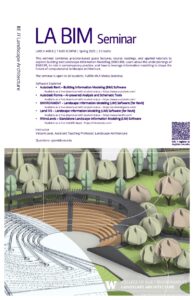 Vincent Javet
Vincent Javet
3 credits, Counts towards MLA Media Selective
T 6:00 – 8:50PM
This seminar combines practice-based guest lectures, course readings, and applied tutorials to explore Building and Landscape information Modeling (BIM/LIM). Learn about the underpinnings of BIM/LIM, its role in contemporary practice, and how to leverage information modeling to shape the future of computational landscape architecture.
This Seminar is open to all students.
Software explored includes:
- Autodesk Revit – Building information Modeling (BIM) Software:Available as a free download with student status – https://www.autodesk.com/
- Autodesk Forma – AI-Powered Analysis and Schematic Tool: Available as a free download with student status – https://www.autodesk.com/
- ENVIRONMENT – Landscape Information Modeling (LIM) Software [for Revit] Available as a free download with student status – https://arcintelligence.com/
- Land F/X – Landscape Information Model (LIM) Software [for Revit] Available as a free download with student status – https://www.landfx.com/
- RhinoLands – Standalone Landscape Information Modeling (LIM) Software Available as a free download with student status – https://www.rhinolands.com/
LArch 498 Community Engagement for Social Cohesion
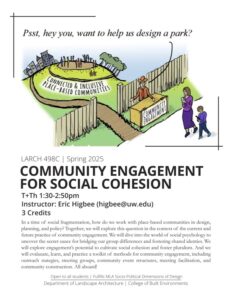 Eric Higbee
Eric Higbee
3 Credits, Counts towards MLA Socio-political Dimensions of Design Selective
TTh 1:30 – 2:50PM
In a time of social fragmentation, how do we work with place-based communities in design, planning, and policy? Together, we will explore this question in the context of the current and future practice of community engagement. We will dive into the world of social psychology to uncover the secret sauce for bridging our group differences and fostering shared identities. We will explore engagement’s potential to cultivate social cohesion and foster pluralism. And we will evaluate, learn, and practice a toolkit of methods for community engagement, including outreach strategies, steering groups, community event structures, meeting facilitation, and community construction. All Aboard!
LArch 563 Ecological Design & Planning
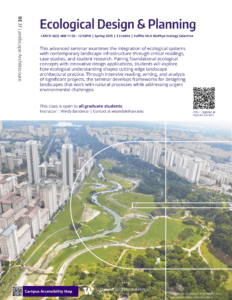 Windy Bandekar
Windy Bandekar
3 credits, Counts towards MLA BioPhys Ecology Selective
MW 11:30 – 12:50PM
Open to all graduate students.
This advanced seminar examines the integration of ecological systems with contemporary landscape infrastructure through critical readings, case studies, and student research. Pairing foundational ecological concepts with innovative design applications, students will explore how ecological understanding shapes cutting-edge landscape architectural practice. Through intensive reading, writing, and analysis of significant projects, the seminar develops frameworks for designing landscapes that work with natural processes while addressing urgent environmental challenges.
LArch 572 Research Methods for Design
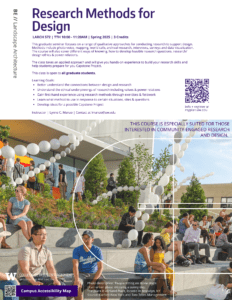 Lynne C. Manzo
Lynne C. Manzo
3 Credits
TTh 10:00 – 11:20AM
This class is open to all graduate students.
This graduate seminar focuses on a range of qualitative approaches for conducting research to support design. Methods include photo-voice, mapping, world cafe, archival research, interviews, surveys and data visualization. The course will also cover different ways of knowing, how to develop feasible research questions, research/ design ethics & power relations. This class takes an applied approach and will give you hands-on experience to build your research skills and help students prepare for you Capstone Project.
Learning Goals:
- Better understand the connections between design and research
- Understand the ethical underpinnings of research including values & power relations
- Gain first-hand experience using research methods through exercises & fieldwork
- Learn what method to use in response to certain situations, site & questions
- Develop ideas for a possible Capstone Project
Winter 2025 Courses Open to Non Majors + Special Topics
L Arch 300 Introduction to Landscape Architecture Studio
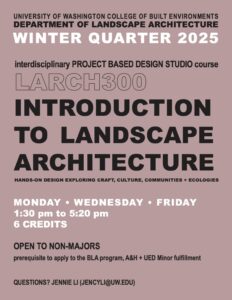 Shaunta Butler
Shaunta Butler
6 credits A&H, BLA prerequisite
MWF 1:30-5:20
SLN: 16356
LARCH300 is an overview of the broad spectrum of the landscape architecture profession. Students will be introduced to the creative design process via contemporary methods, applications, and practices of landscape design. They will develop the basic skills and fundamental concepts of landscape architectural design and explore site design through projects that require them to draw, research, build, analyze, collaborate, and present ideas that encompass various facets of the field. Students will have a portfolio by the end of the course, and be prepared to apply for the BLA program if desired.
L Arch 361 Human Experience of Place
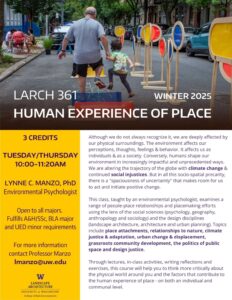 Lynne Manzo
Lynne Manzo
3 credits A&H/SSc+Div, counts towards BLA major
TTh 10:00-11:20
SLN: 16359
Although we do not always recognize it, we are deeply affected by our physical surroundings. The environment affects our perceptions, thoughts, feelings & behavior. It affects us as individuals & as a society. Conversely, humans shape our environment in increasingly impactful and unprecedented ways. We are altering the trajectory of the globe with climate change & continued social injustices. But in all this socio-spatial precarity, there is a “spaciousness of uncertainty” that makes room for us to act and initiate positive change.
This class, taught by an environmental psychologist, examines a range of people-place relationships and placemaking efforts using the lens of the social sciences (psychology, geography, anthropology and sociology) and the design disciplines (landscape architecture, architecture and urban planning). Topics include place attachments, relationships to nature, climate justice & adaptation, urban change & displacement, grassroots community development, the politics of public space and design justice.
Through lectures, in-class activities, writing reflections and exercises, this course will help you to think more critically about the physical world around you and the factors that contribute to the human experience of place – on both an individual and communal level.
L Arch 353 Modern Landscape History
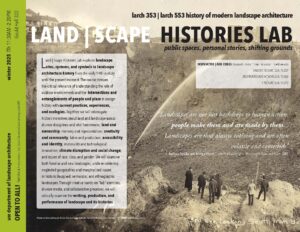 Elizabeth Umbanhowar
Elizabeth Umbanhowar
5 Credits A&H/SSc+Writing, counts towards BLA major
TTh 11:30–2:20
SLN: 16357
This course explores landscape sites, systems, and symbols from the early 19th century until the present moment, stressing the intersections and entanglements of people and place in history with current politics, experiences, and ecologies. Through creative “lab” exercises, diverse media, and collaborative processes, we will critically examine the writing, production, and performance of landscape and its histories thematically through the diverse lenses of: power and ownership; memory and representation; knowledge and experience; labor and production; materiality and technological innovation; climate disruption and social change; identity and emotion; and race, class, and gender.
L Arch 498C Perceptions of Nature in the Dense City
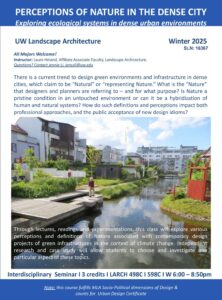 Laure Heland
Laure Heland
3 Credits
W 6:00-8:50 PM, counts towards MLA Socio-political Dimensions of Design Selective
SLN: 16367
There is a current trend to design green environments and infrastructure in dense cities, which claim to be “Natural” or “representing Nature.” What is the “Nature” that designers and planners are referring to – and for what purpose? Is Nature a pristine condition in an untouched environment or can it be a hybridization of human and natural systems? How do such definitions and perceptions impact both professional approaches, and the public acceptance of new design idioms?
L Arch 561 Human Experience of Place
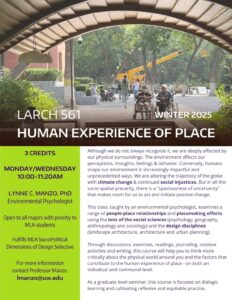 Lynne Manzo
Lynne Manzo
3 Credits, counts towards MLA Socio-political Dimensions of Design Selective
MW 10:00-11:20
SLN: 16373
Although we do not always recognize it, we are deeply affected by our physical surroundings. The environment affects our perceptions, thoughts, feelings & behavior. It affects us as individuals & as a society. Conversely, humans shape our environment in increasingly impactful and unprecedented ways. We are altering the trajectory of the globe with climate change & continued social injustices. But in all this socio-spatial precarity, there is a “spaciousness of uncertainty” that makes room for us to act and initiate positive change.
This class, taught by an environmental psychologist, examines a range of people-place relationships and placemaking efforts using the lens of the social sciences (psychology, geography, anthropology and sociology) and the design disciplines (landscape architecture, architecture and urban planning). Topics include place attachments, relationships to nature, climate justice & adaptation, urban change & displacement, grassroots community development, the politics of public space and design justice.
Through discussions, exercises, readings, journaling, creative activities and writing, this course will help you to think more critically about the physical world around you and the factors that contribute to the human experience of place – on both an individual and communal level.
As a graduate level seminar, this course is focused on dialogic learning and cultivating reflexive and equitable practice.
As a graduate level seminar, this course is focused on dialogic learning and cultivating reflexive and equitable practice.
Past Selectives +Electives
Winter 2026 MLA Selective Course Offerings
Winter 2026 BLA Directed Electives
Autumn 2025 MLA Selective Course Offerings
Autumn 2025 BLA Directed Electives
Summer 2025 BLA Directed Electives
Winter 2025 MLA Selective Options
Winter 2025 BLA Directed Electives



